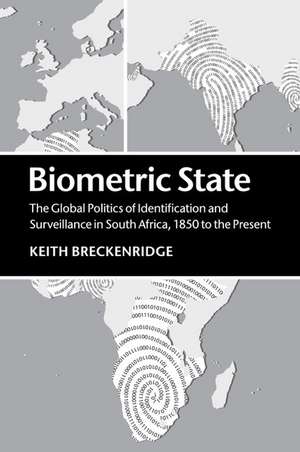Biometric State: The Global Politics of Identification and Surveillance in South Africa, 1850 to the Present
Autor Keith Breckenridgeen Limba Engleză Paperback – 19 oct 2016
| Toate formatele și edițiile | Preț | Express |
|---|---|---|
| Paperback (1) | 283.79 lei 6-8 săpt. | |
| Cambridge University Press – 19 oct 2016 | 283.79 lei 6-8 săpt. | |
| Hardback (1) | 694.23 lei 6-8 săpt. | |
| Cambridge University Press – oct 2014 | 694.23 lei 6-8 săpt. |
Preț: 283.79 lei
Nou
Puncte Express: 426
Preț estimativ în valută:
54.31€ • 58.07$ • 45.28£
54.31€ • 58.07$ • 45.28£
Carte tipărită la comandă
Livrare economică 17 aprilie-01 mai
Preluare comenzi: 021 569.72.76
Specificații
ISBN-13: 9781107434899
ISBN-10: 1107434890
Pagini: 266
Ilustrații: 3 b/w illus. 1 map
Dimensiuni: 153 x 230 x 15 mm
Greutate: 0.36 kg
Editura: Cambridge University Press
Colecția Cambridge University Press
Locul publicării:New York, United States
ISBN-10: 1107434890
Pagini: 266
Ilustrații: 3 b/w illus. 1 map
Dimensiuni: 153 x 230 x 15 mm
Greutate: 0.36 kg
Editura: Cambridge University Press
Colecția Cambridge University Press
Locul publicării:New York, United States
Cuprins
Introduction: the global biometric arena; 1. Science of empire: the South African origins and objects of Galtonian eugenics; 2. Asiatic despotism: Edward Henry on the Witwatersrand; 3. Gandhi's biometric entanglement: fingerprints, Satyagraha and the global politics of Hind Swaraj; 4. No will to know: biometric registration and the limited curiosity of the gatekeeper state; 5. Verwoerd's bureau of proof: the Apartheid Bewysburo and the end of documentary government; 6. Galtonian reversal: apartheid and the making of biometric citizenship; Epilogue: empire and the mimetic fantasy; Conclusion; Bibliography; Index.
Recenzii
'This fascinating and deeply researched study of the transnational politics of biometric measurement and surveillance places South Africa in a global field force of scientific and technological experimentation. Beginning with Galton and Gandhi, it shows how the power of technology can be deployed for many different reasons, and often with surprising outcomes.' Saul Dubow, Queen Mary, University of London
'Keith Breckenridge, one of South Africa's leading historians, has written a fascinating, highly original social archaeology of the 'biometric state' … A magisterial work whose scope covers two centuries and many parts of the planet, it explains, counter-intuitively, why South Africa is the most advanced of such states in the world today, why it is a laboratory, in this respect, for other nations. By dint of its thoughtful scholarship, the book compels us to rethink the future history of states everywhere.' John Comaroff, Harvard University, Massachusetts
'A perceptive and provocative study, full of ideas and punchy arguments, that casts new light on the global dimensions and political continuities of South Africa's identification state before, during and after apartheid. Breckenridge not only disentangles this intricate history but embeds it in a fresh account of how colonial and post-colonial states have been seduced by the siren-song of technological solutions to political problems.' Jane Caplan, University of Oxford
'Brilliantly, Breckenridge sees South Africa as a 'global laboratory for biometric government'. This highly engaging and consequential analysis traces the vital links between colonialism and contemporary surveillance, provocatively placing biometrics and the state in some unfamiliar but compelling relations with each other. The lights keep coming on, to the very end of the book.' David Lyon, Queen's University, Ontario
'Keith Breckenridge, one of South Africa's leading historians, has written a fascinating, highly original social archaeology of the 'biometric state' … A magisterial work whose scope covers two centuries and many parts of the planet, it explains, counter-intuitively, why South Africa is the most advanced of such states in the world today, why it is a laboratory, in this respect, for other nations. By dint of its thoughtful scholarship, the book compels us to rethink the future history of states everywhere.' John Comaroff, Harvard University, Massachusetts
'A perceptive and provocative study, full of ideas and punchy arguments, that casts new light on the global dimensions and political continuities of South Africa's identification state before, during and after apartheid. Breckenridge not only disentangles this intricate history but embeds it in a fresh account of how colonial and post-colonial states have been seduced by the siren-song of technological solutions to political problems.' Jane Caplan, University of Oxford
'Brilliantly, Breckenridge sees South Africa as a 'global laboratory for biometric government'. This highly engaging and consequential analysis traces the vital links between colonialism and contemporary surveillance, provocatively placing biometrics and the state in some unfamiliar but compelling relations with each other. The lights keep coming on, to the very end of the book.' David Lyon, Queen's University, Ontario
Notă biografică
Descriere
A groundbreaking study of South Africa's role as a site for global experiments in biometric identification throughout the twentieth century.












